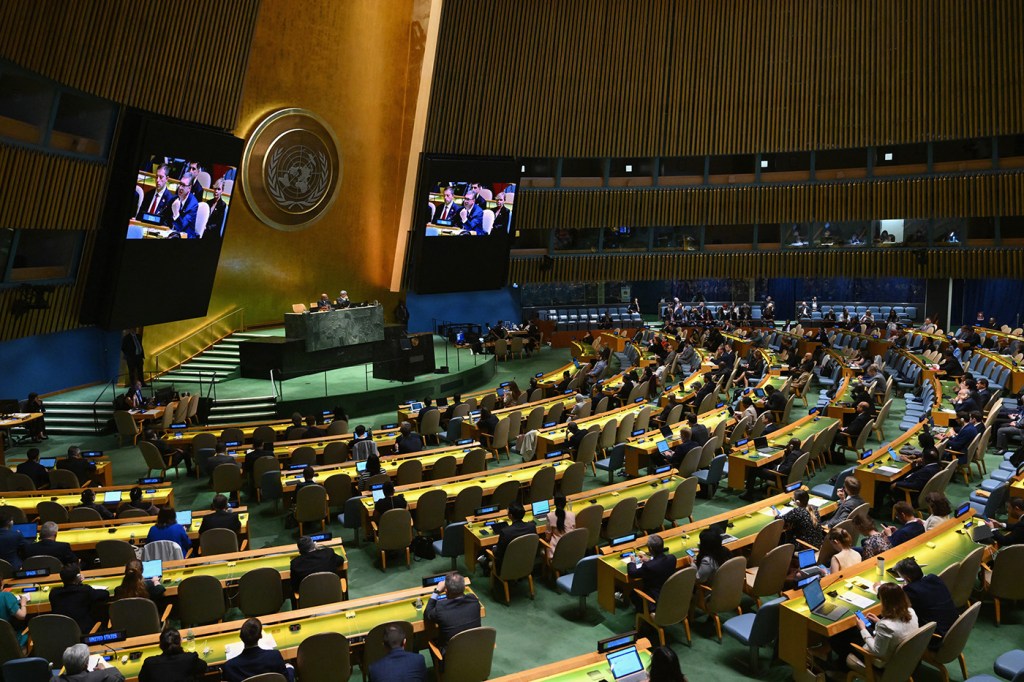Russia-Ukraine, Israel-Hamas: Can international law stand up to global conflict?
In an increasingly multipolar world, does competition between the great powers threaten to undermine international law? Northeastern experts hold out hope for robust accountability in Ukraine and Gaza.

This report is part of ongoing coverage of the Israel-Hamas war. Visit our dedicated page for more on this topic.
With protracted wars going on in Europe and the Middle East, the international legal system — and the liberal international order, itself — is being tested like never before.
Those wars have come at significant cost in terms of civilian casualties, a fact that has led some to question the efficacy of international humanitarian law, a subset of international law that concerns the protection of civilians during armed conflict.
In a recent issue of Foreign Affairs, one observer argues that the so-called laws of war have “broken down” as civilian deaths in Gaza climb to as high as 35,000, according to some estimates. In Ukraine, more than 10,000 civilians have been killed in Russia’s ongoing war, according to Oxfam International.
In a world system with a shared set of rules for how wars must be conducted, wherever the atrocities of war play out, the specter of accountability looms. But accountability under the international system “is a long process,” says Mai’a Cross, dean’s professor of political science, international affairs and diplomacy, and director of the Center for International Affairs and World Cultures at Northeastern University.
One common criticism of international humanitarian law is that there is no enforcement to hold leaders accountable. The International Criminal Court — the judicial body responsible for prosecuting war crimes, crimes against humanity, genocide and crimes of aggression — is one of the primary mechanisms for upholding international law. While ICC officials have issued arrest warrants for Russian leaders, including Russian President Vladimir Putin, it must rely on national police forces to carry out those arrests.
What’s more, the U.S., Russia and China haven’t signed on to, or don’t recognize, the ICC’s authority. And it’s the U.S., Russia and China — along with the United Kingdom and France — that possess veto power on the United Nations Security Council, the arm of the U.N. charged with maintaining peace and security abroad. The U.N. has tried to rein in the permanent members’ veto power, with some diplomats noting that Russia’s use of the veto while it wages war in Ukraine amounts to “a weapon of hatred and war.”
“Talks of reform are ongoing, but there’s a lot of resistance, naturally — not least from the permanent members themselves,” says Fiona Creed, associate professor at Northeastern who formerly served as executive director of the United Nations Association of Greater Boston.
In an increasingly multipolar world, one marked by the rise of superpowers such as Russia and China, some observers say that competition between the great powers threatens to undermine international law as a framework for promoting human rights and protecting civilians.
“It’s been consistent across time that nations have defied international law — and these violations are not unusual,” Creed says. “The question I would observe is: Is it possible to strengthen the U.N. system and other international organizations to really bring the enactment and enforcement of international law to another level?”
For all of its imperfections, the current system — comprising not just the U.N., the ICC and other nongovernmental organizations, but organizations such as the European Union and NATO — reflects a greater degree of cooperation and common purpose than it does disunity, especially with regard to the Russia-Ukraine and Israel-Hamas wars, the experts say.
“I think that the liberal international order is actually built on consensus, although the U.S. has had to play a bigger role in maintaining it because of its superpower status,” Cross says.
That cohesion, Cross says, has led to a great deal of international pressure on countries that defy international law, not just in the form of the shared condemnation of the atrocities in Ukraine and Gaza, but legal precedents set by the ICC’s attempts to prosecute violations in both conflicts.
Absent clear enforcement mechanisms, that “pressure” serves several purposes: it can help deter future atrocity; lead to collective support for international sanctions through organizations like the EU; and feed social movements that then apply pressure on a domestic level, says Zinaida Miller, Northeastern professor of law and international affairs.
Featured Posts
The ICC alone, she says, can’t — and isn’t designed to — prevent war from happening.
“It would be putting too much on the court to think that it can itself resolve or prevent conflict,” Miller says. “I don’t think criminal courts can do that, and we tend to put a lot of emphasis on these international bodies in particular because they are adjudicating in relation to conflict.”
Recently, the ICC announced that it would seek arrest warrants for several senior Russian military officials, having already charged Putin with war crimes in connection with the alleged abduction of Ukrainian children. The international panel is also seeking warrants for Israeli Prime Minister Benjamin Netanyahu, his defense minister and leaders of Hamas on charges of war crimes linked to the ongoing Israel-Hamas war.
Since the court’s inception in 1998, it has tended to focus its prosecutions on African nations (in 2021, 10 of its 14 investigations involved Africa). Miller sees the latest string of arrest warrants in connection with Russia, Israel and Hamas as, in part, an attempt to correct for that bias.
“Within the four walls of what is the office of the prosecutor of the ICC, it does demonstrate growth and development within the court,” Miller says.
Of course, it seems “somewhat unlikely” that ICC officials will actually arrest Putin, Miller says. That could also be the case for Netanyahu and others involved in the war in Gaza, as those charged would have to travel to a nation that has ratified, or partied with, the Rome Statute, the international treaty that established the ICC.
Miller says that warrants for Israeli officials nonetheless “will have serious legitimacy costs for Israel. Even the request for the warrants affirms the grave violations of international law being committed by Israel,” and the issuing of warrants would seriously limit where those officials can travel.
Despite an insistence on hope for the international humanitarian system, world leaders continue to worry about the state of international relations, calling on greater funding and reform to address the growing threat of conflict. “We must come together to urgently reshape and strengthen our multilateral institutions,” U.N. Secretary-General António Guterres said last month.
“The Security Council is stalled on these conflicts,” Miller says, “but that doesn’t mean the UN can’t make a difference in other areas, and there are many other actors in the international system that can continue to push for more equitable resolutions.”











